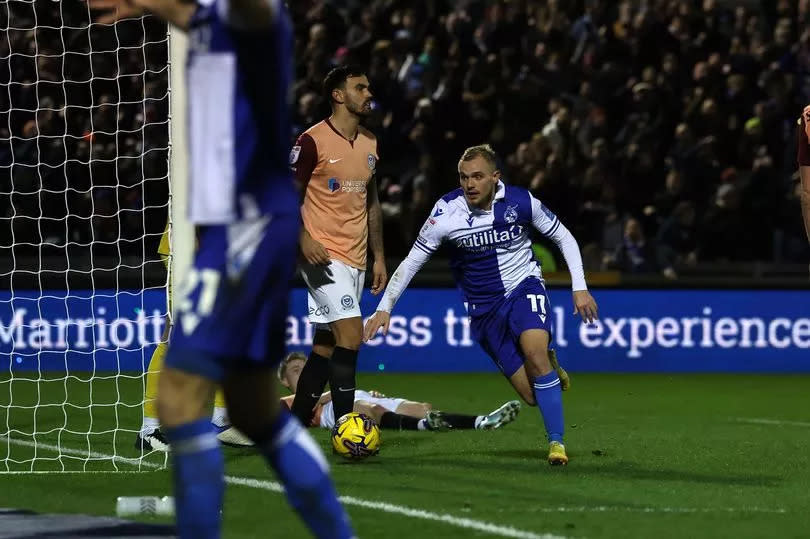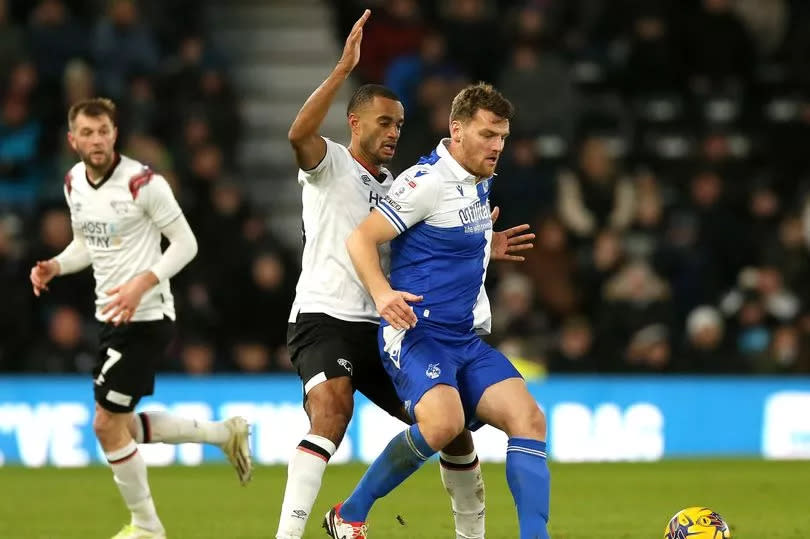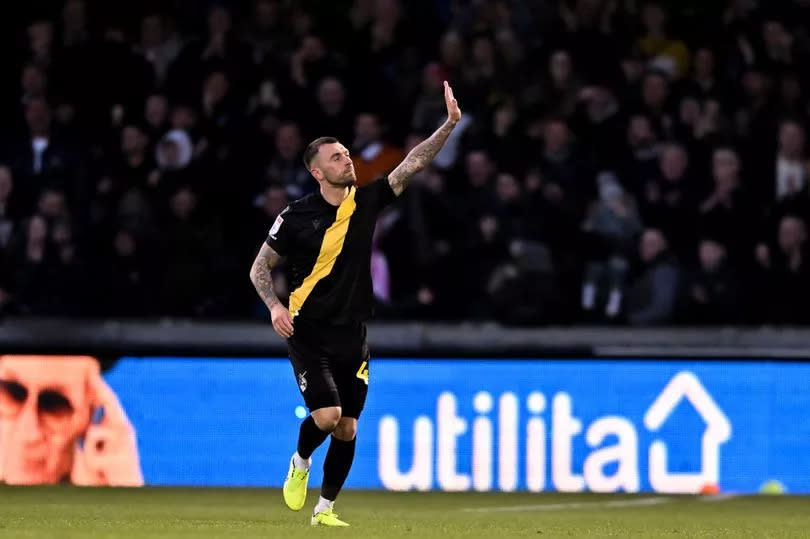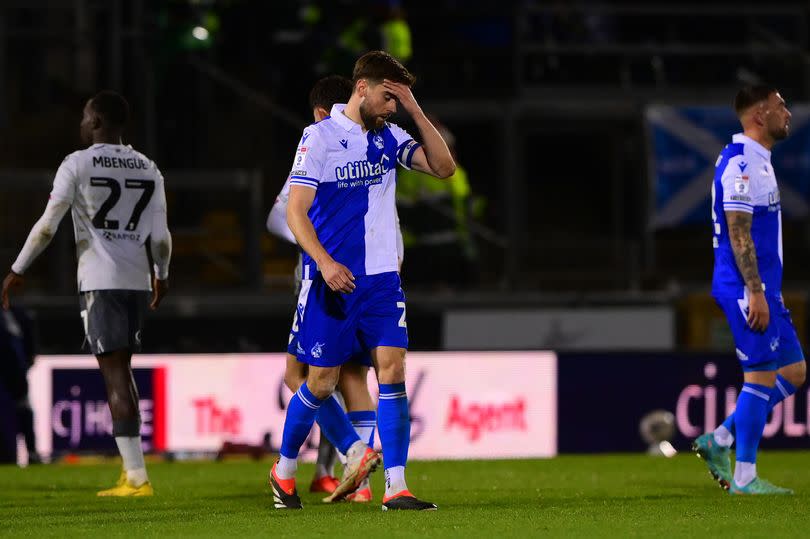Injuries, first goals and a lack of consistency: The stories of Bristol Rovers' 2023/24 season

Well, there we have it. 55 games that have conjured up highs and lows for Bristol Rovers over the course of a campaign that will certainly be reflected on with a sense of 'what if?' Admittedly, it was a season of transition for the football club with a takeover, a summer that saw 13 players signed as well as a managerial change but there is a bit of a flat feel about the place after a poor conclusion to the campaign, coinciding with the realisation of how imperative it is that the next four months of preparation are done as well as possible.
As has been well-documented, the situation that Rovers now face before the next time a ball is kicked in League One is building a squad capable of progress, while starting off with a foundation of players that could be relatively limited in number. It's tricky to put an accurate number forward for the amount of players needed to be signed over the course of the summer but 15 seems a reasonable ballpark figure.
However, it was never forecasted to be this complicated over the course of the early months of the campaign where the Gas' performances certainly warranted a better points tally than what was earned. By the time Joey Barton was sacked at the end of October, Rovers had collected 16 points from their opening 13 games and sat 16th, but there was certainly strong enough evidence via the dominance of certain performances that the Gas really should have had an extra seven points from games against Portsmouth, Barnsley and Oxford United at least which would have had them in the play-off positions.
Alas, performances don't guarantee points and subsequently Barton was dismissed with Andy Mangan assuming the role of caretaker. Although, had you said ahead of his first game in charge against Northampton Town that he would preside over seven matches, eyebrows certainly would have been raised. The whole process took far longer than anyone would have liked and the fact that the individual who eventually received the job was still in charge of his previous role for the first three weeks of the recruitment process says a great deal.
Matt Taylor was, of course, that man and the first two games gave the 42-year-old an early indication of some of the issues that had occurred over the course of the season as Rovers missed a hatful of chances away at League Two Crawley Town in the EFL Trophy and eventually lost 2-1, before a uninspiring first-half display against Cheltenham Town meant that the Gas were somewhat lucky to take a point from Taylor's first league game in charge. The remainder of 2023 though certainly generated some hope.
Playing a second League Two team that Rovers could potentially face next season after making the play-offs in the space of a week, the Gas cruised to a 4-0 lead away at Crewe Alexandra in the FA Cup before a spirited fight back from the hosts gave the third tier side something to worry about as the game finished 4-2. Taylor's men then went on to beat Bolton Wanderers away, eventual champions Portsmouth at home as well as Charlton Athletic with an unlucky 3-1 defeat at Blackpool in the mix too.

Going into the New Year Rovers were ninth and nine points off of the play-offs with a game in hand and another 23 matches left to play in League One. For context, Exeter City were 20th, Wycombe Wanderers were 19th, Wigan Athletic were 18th, Leyton Orient were 13th, Lincoln City were 11th and Northampton Town were 10th. All six teams have gone on to finish higher than the Gas in the league table with four making the top half.
There was quite rightly hope that the second half of the season would finally bear fruit for this team full of potential but ultimately their form over the past 23 league games has been that of a relegation-threatened side and any paper over cracks that hadn't quite appeared at the surface disintegrated swiftly.
Fourteen defeats, seven wins and two draws gave Rovers a points-per-game average of exactly 1.0. Over the course of the whole season, such an average would have seen slim survival this term.
Ultimately though, when you categorise the Gas' best and worst performances of the season, the calibre of the opposition in each will be the most hair-pulling aspect. Rovers took four points against the eventual league winners as well as giving Derby County a close game at their place, beating Bolton, were deserving of at least one result against Peterborough, a win against Oxford United that should've been two and doing enough to thrash Barnsley in their first home game which ended 1-1 before missing another decent amount of chances in the 2-1 defeat at Oakwell. That's out of the sides that finished in the top six and where Rovers dreamed of finishing at the beginning of the campaign.

However, in the 16 games against the final bottom-eight, the Gas collected 22 points from a possible 48. If that doesn't stick out like a sore thumb I'm not quite sure what will.
That top-six dream has slipped further and further away from Rovers as the campaign has gone onc, and come the end of the season ended up being 19 points away. Even a top-half finish would have marked clear progress on last term's 17th place.
Admittedly, it's not been all doom and gloom and the season is an improvement on last year as the Gas finished two places higher and four points better off but it's the feeling that those margins could have been considerably greater that leaves the most bitter of tastes in the mouth.
When assessing the season as a whole though it's actually relatively straightforward to put fingers on why it went wrong in the places it did with common trends prolonging throughout the majority, if not entirety, of the campaign. So, on that note, here are some of the stories of the season that has left everyone associated with the football club feeling that the past eight months could have warranted much greater success.
Injuries prevent Rovers from fielding a full-strength 11
Quite possibly the biggest factor that held Rovers back from their potential was the amount of time they were actually able to field a full-strength XI. Naturally there would be some debate as is common verse amongst football fans but if you were to ask every Gashead to name what they saw as their strongest 11 out of the players currently contracted to the football club, the assumption is that actually they wouldn't look too different. But when you assess the individual appearance tallies that's when you start to see the predicament the Gas couldn't get themselves out of all year.
Twenty three players made 15 or more appearances across all competitions over the course of the season but only 14 made 30 or more and just six reached the 40-games bracket. Listing every injury suffered is enough for a separate piece on its own but you certainly feel as though the time missed by Grant Ward, Jack Hunt, Jordan Rossiter and James Wilson particularly caused issues, most notably Ward and Hunt.
The pair made 27 and 23 appearances, respectively, but quickly established themselves as key assets, particularly Hunt who enjoyed two goals, two assists and two clean sheets within his first seven league matches. Additionally, the right-back is one of the senior heads within the squad with experience certainly an element that has lacked in defence at times this campaign.
However, for the 33-year-old it's not like he sustained one long-term injury, it's been a repeat of one month absences at a time which has eventually seen him start less than half of the Gas' League One matches this term.

As for Ward, the midfielder makes a significant difference to how Rovers function from the middle of the park with the amount of distance he covers and his combative nature. The 29-year-old offers a dynamism that none of Taylor's other midfielders possesses which makes him such an effective box-to-box middle man. It's no coincidence that in most of the Gas' strongest performances of the campaign, Ward started.
Frustratingly though, a serious hamstring injury has held the former Tottenham Hotspur youth player back from the campaign he and his team would have wanted from himself which now means that pre-season will be spent ensuring that such a predicament doesn't happen again because you would expect that the vast majority, if not all, of fans' best possible 11s have Ward in.
Struggles for consistency
You're never going to get close to the top-six if you can't muster more than two consecutive wins or put together a decent enough unbeaten streak. On five occasions did Rovers manage to string back-to-back league wins together but that elusive third consistently remained out of reach with it always ending in defeat. To say that Rovers couldn't earn more than six points from a three-game period over the course of the entire season is quite damning.
Naturally, the above point relates directly to this given that the frequent nature of injuries prevented the Gas from being able to construct any sort of consistency as changes were constantly being forced. Suspensions also didn't help, with Rovers actually finishing the season with the third-most red cards (six) while also having a couple of yellow card bans to contend with too.
As harsh as it feels to say, the only consistency the Gas were able to find was when losing matches having started the year with a four-game losing streak in the league as well as setting a new club-record for seven games without scoring. Frustratingly, Rovers also managed to find the target in 23 consecutive matches between October and January which highlights just how difficult it's been to maintain any sort of similarity.
It is that struggle to put together some sort of run that saw an impressive points overhaul that probably stands out the most though, but fortunately there was still enough quality to ensure that a winless streak didn't go on longer than seven games. It's certainly an aspect that will need improvement if Taylor's men are going to improve on this season next term.
A club-record goalless streak and its damning nature
On the topic of runs and that goalless streak of seven matches, ultimately that was a major metaphoric kick in the shins. Had Rovers avoided such a drastically poor run, the general consensus of the season would most likely be a great deal more positive than it is currently. Setting a new club record is always a big deal and when it's for a negative statistic the feeling is particularly glum. However, besides the lack of goals, those seven games saw just two points from a possible 21 picked up which could well have proven to be the difference between finishing within and outside of the top half.
After the win at Leyton Orient, Rovers were 11th with a five-point cushion within the top 12 while also having a game in hand on 13th place Wigan. They were 11 points off of the top-six with 11 matches to go though which still meant that it would have taken a considerable effort to propel themselves into the conversation let alone the actual top-six. However, had you offered supporters an 11th place finish at the start of the season, you would expect that most would have happily taken that.
The most frustrating aspect of the run though is the fact that it coincided with some outstanding form from those below the Gas at the time who have gone on to finish above them in the table despite being below for the vast majority of the campaign. Wigan, Wycombe and Exeter in particular have finished their seasons in style.

If you dissect the games that made up that run, there were certainly enough opportunities to take away more than what was earned in way of points in a handful of the games. The draws against Fleetwood and Shrewsbury should've both been wins which is an extra four points while on another day against Bolton and Peterborough Rovers would have taken something. Meanwhile, although the defending was considerably poor, the Gas could have easily taken the lead at Lincoln City before going on to lose 5-0 which would have potential turned the momentum of the match on its head. Based on chances, that game could have easily finished 6-4.
So yes, there were times where Taylor's men were unlucky but there were also some seriously poor displays which probably reflected where the squad was at in terms of heading towards the end of its cycle, a point the Rovers manager made after the defeat at Wigan on Saturday. Ultimately, without a run as drab as that, betting on the Gas to finish in the top half of the table should've guaranteed returns.
First goals and their importance
In some ways this adds on from previously made points, particularly during the seven-game goalless run, but first goals have proven to be so vital in Rovers' games this season and certainly seems to be a critical trait of League One level football.
The Gas scored first in 17 of their 46 matches and won 14 of them, drawing two and losing just once. Meanwhile, in the games where the opposition scored first, their record was 20 defeats, five draws and just two victories with two goalless draws taking the total up to 46. If that doesn't highlight the importance of scoring first, I'm not quite sure what else will.
Sure, with a greater sample size the chances are that Rovers might have dropped a couple more points from winning positions but bar one anomaly away at Burton, the Gas took away a result if they scored first and it was often a win. That's where, with a bit more clinical edge, it feels as though there was an abundance of points left out there as opposed to a couple that might have made a two or three place difference in league position.
Obviously goals against comes into it too and more clean sheets is certainly a target of Taylor's but, despite picking up fewer points, they did improve their shutouts with five in the league compared to the three recorded in the first half of the campaign.
Ultimately though, only four teams conceded more league goals than Rovers' 68 and three of them ended up being relegated while the Gas finished 16th in the goals scored table (52) which, incredibly, is almost identical to their total xG of 52.2 which was the 14th-highest. There's enough evidence there to suggest that tweaks at both ends of the pitch could actually result in pretty pleasing outcomes.
Where would Rovers be without Antony Evans and Chris Martin?
A rhetorical question, yes, but if it had a precise answer it would no doubt be drastically alarming. The pair have scored 26 goals between them with Rovers' total over the course of the campaign across all competitions 72. Evans did also finish with nine assists while Martin got one. Essentially, without the duo's contribution the chances are, without trying to be too hyperbolic, we could be talking about the extremes of a return to League Two.
Obviously, Evans quite rightly won Player of the Season and was undoubtedly the Gas' best all-round player with 19 goal contributions coincided with excellent attendance and being the nucleus of this team from the middle of the park. However, all 16 of Martin's goals came in the league and represents 30.8 per cent of their final total of 52. Naturally a striker is supposed to be the main goal threat but that is almost a third and, without, would undoubtedly have put Rovers in the bottom four.

As we await the retained list at the time of writing for confirmation, the understanding is that the 35-year-old has been offered a new contract and is expected to be at the club next season. Regarding Evans though, that situation might be a bit trickier.
The 25-year-old will enter the final year of his deal next season and, although Taylor admitted he expects the midfielder to stay on, interest elsewhere over the course of the summer is expected to be directed at the midfielder who has undoubtedly become one of the best in his position in the third tier. Right now, you would have to assume that it's going to be difficult to convince him to new terms as well as prevent him from leaving should an attractive offer come his way.
A managerial change and its subsequent effects
Whether it's proven successful or not is a separate discussion but ultimately a change in management is always going to prove to be a key moment in a season when reflecting following its conclusion. Although their statement at the time was very brief before a subsequent interview from Hussain AlSaeed suggested that results were the main reason for Barton's dismissal, you would have to assume that there was a bit more to the board's decision given only 13 league games had been played and the former boss was starting to increasingly come under fire for another segment in the list of eyebrow raising post-match comments when publicly outing Luke Thomas after the defeat at Peterborough United.
As mentioned previously, the recruitment process shouldn't have taken as long as it did and, because it was five weeks of uncertainty, no doubt it affected the players who you can certainly sympathise with, or at least could at the time. At the time, the vast majority of that squad had been brought in by Barton with a significant proportion young enough that he was one of their first managers.
Certain allegiances were further exemplified when Andy Mangan took caretaker charge and the likes of Sam Finley, Antony Evans and Aaron Collins went on record to share their desire to see the extremely likeable Scouser get the job on a permanent basis. Ultimately, when Mangan didn't get the job, Taylor inherited a squad that had a great deal of loyalty to the previous regime and, with hindsight, perhaps that has made a bigger impact on form and performances than initially thought.
This roster wasn't picked by the current manager bar Kamil Conteh and three loanees who will now return to their parent clubs. Admittedly, there are plenty of scenarios where managers who come in mid-season don't have to change too much in regards to personnel to start progressing and are able to largely work with what they've got. However, this isn't a normal scenario.
To have so many players out of contract is a rarity in itself but there was also a particular element of loyalty to the previous management within sections of the squad and allegiance to the man currently in charge doesn't seem to quite be there yet.
Ultimately though, it's Taylor who will stay and a significant amount of players who will move on but, regardless of what he's inherited, there's no hiding from the fact that the 42-year-old needs his new-look team to start next term well because the mood before the successive wins over Cheltenham and Cambridge was more toxic than it was just before Barton was sacked or frustrations were hitting the roof when there was still uncertainty regarding who would replace him deep into Mangan's brief spell in charge.
Form in the second half of the season hasn't been good enough and both parties will take responsibility for that, the manager and the players, but tensions have risen over the past two months and supporters will want to see evidence of smart recruitment ahead of next campaign otherwise there is a fear that we could have a repeat situation all over again.

 Yahoo News
Yahoo News 
